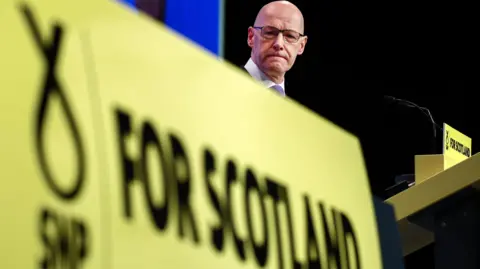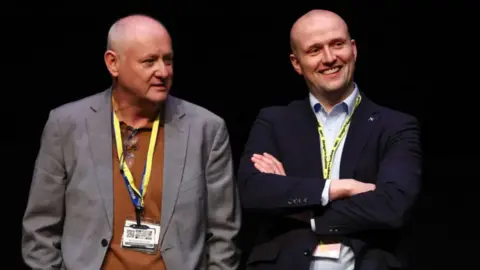SNP plans to cut staff at party headquarters
 Getty Images
Getty ImagesThe SNP's ruling body has proposed cutting the number of staff at its headquarters by more than a third, from 26 to 16.
The party's national executive committee (NEC) agreed to a proposal to "streamline" staffing during a meeting on Saturday.
A voluntary redundancy scheme has been opened.
National secretary Councillor Alex Kerr said the move would "protect the long-term finances of the party".
The announcement comes as its focus shifts to the 2026 Holyrood election.
The SNP, which has been in power since 2007, faces a resurgent Labour Party which increased its Scottish seats at Westminster from one to 37 in the summer's general election.
Mr Kerr said: "The national executive committee has been tasked with delivering a modern, dynamic election-winning party to win in 2026 and beyond - and today's agreement to consult on a new structure at headquarters makes key progress to deliver on that aim.
"The proposal, agreed by the SNP National Executive Committee today, would get HQ into shape for future elections and for the fight for independence.
"It would mean that not everyone currently employed at HQ will continue with us but a streamlined headquarters protects the long-term finances of the party and delivers on the modern, professional, election-winning organisation Scotland needs."
Mr Kerr said the SNP's success was built on the work of many people - at headquarters, in local campaign teams and those in elected office.
He also thanked those who worked for the party and supported its aim of an independent Scotland.
 Getty Images
Getty ImagesThe party suffered a heavy defeat in July's general election and was left with nine, MPs compared to 48 in 2019.
Along with the loss of its status as the third biggest party at Westminster, the SNP also lost out on a bulk of its so-called short money.
This is provided to opposition parties to allow them to carry out their parliamentary duties.
Last month the SNP's chief executive Murray Foote quit the post after 14 months.
The former newspaper editor said that he "could not make the necessary personal commitment" to leading a reorganisation of the party after their disappointing election performance.
SNP membership numbers
The SNP has also struggled for substantial donations in recent years, relying instead on membership fees.
It is the biggest political party in Scotland, with figures from June showing it had 65,000 members.
But falling membership numbers have triggered a drop in income.
The current membership is roughly half what it was after a surge following 2014's independence referendum.
This year, 81% of the party's funding came from membership fees, compared to just 35% in 2015 - the year former First Minister Nicola Sturgeon led it to a massive 56 seats in the general election.
The party's finances have been improving recently and its most recent accounts showed it was in surplus.
Meanwhile, there is an ongoing police probe into the SNP's finances.
The party's former chief executive Peter Murrell, who is married to former first minister and ex-SNP leader Nicola Sturgeon, has been charged with embezzling party funds.
The Crown Office are currently considering whether there is enough evidence to prosecute Mr Murrell, and whether a prosecution would be in the public interest.
Sturgeon and former SNP treasurer Colin Beattie were also arrested and released without charge, pending further investigation.
